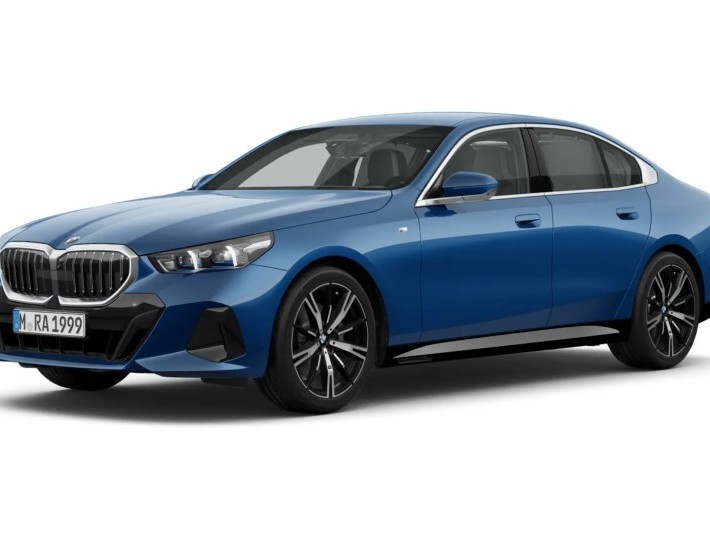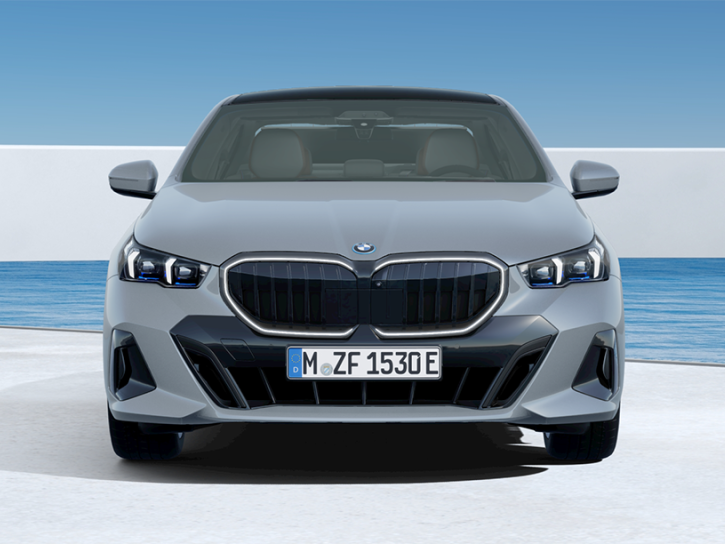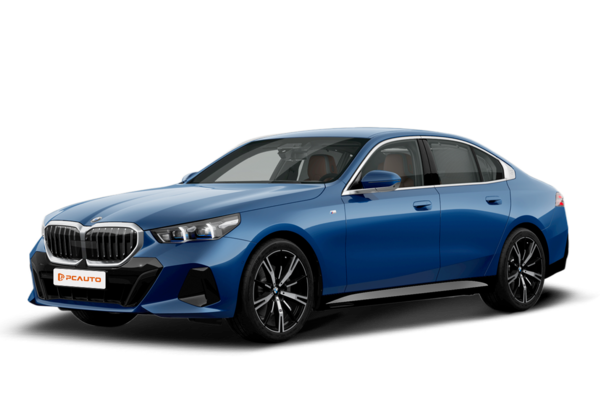Q
Is the BMW 5 Series fuel efficient?
The BMW 5 Series performs well in terms of fuel economy, especially the models equipped with EfficientDynamics technology, such as the 520i and the 530e plug - in hybrid version. They both have good performance in combined fuel consumption. The urban fuel consumption of the 520i is about 8 - 9L per 100km, and it can even drop to around 6L per 100km during high - speed cruising. As a plug - in hybrid model, the 530e can achieve a range of 50 - 60 kilometers in pure - electric mode, which is very suitable for short - distance commuting and can significantly reduce fuel consumption. For Malaysian consumers who often drive in the city, the 530e would be a more economical choice, as the fuel price in Malaysia is relatively high, and hybrid models can save a lot of fuel costs.
In addition, the BMW 5 Series is also equipped with intelligent energy - saving technologies, such as the automatic start - stop system and brake energy regeneration, which further optimize fuel efficiency. It should be noted that the actual fuel consumption is also affected by driving habits, road conditions, and vehicle maintenance. It is recommended to perform regular maintenance to keep the vehicle in optimal condition.
If you have higher requirements for fuel economy, you can also consider other luxury brand models in the same class, which also have good performance in energy - saving technologies. However, the BMW 5 Series still has unique advantages in terms of handling and comfort.
Special Disclaimer: This content is published by users and does not represent the views or position of PCauto.
Related Q&A
Q
What is the lineup of the 2025 BMW 5 Series?
The 2025 BMW 5 Series offers a diverse range of models, including gasoline, plug-in hybrid, and fully electric versions, catering to different consumer needs. The gasoline lineup is expected to include the 520i, 530i, and 540i, powered by 2.0L turbocharged four-cylinder and 3.0L turbocharged six-cylinder engines respectively, all mated to an 8-speed automatic transmission. Some trims will also come with the xDrive all-wheel-drive system. The plug-in hybrid variants, 530e and 545e, strike a balance between fuel efficiency and performance, with improved all-electric range. The fully electric i5 will be available in eDrive40 and M60 xDrive trims, with the latter boasting stronger power outputand all-wheel drive. The new 5 Series features the latest design language, with an interior equipped with a curved dual-screen setup and iDrive 8.5 system, exuding a strong tech vibe. Notably, the 5 Series has always been known for its handling and luxury, and the new model sees upgrades in chassis tuning and sound insulation, along with added driver assistance features like automatic parking and highway assist. For consumers who value driving experience and tech features, this car is definitely a solid option to consider.
Q
How much is BMW 5 Series 2025 in Dubai?
The 2025 BMW 5 Series pricing in Dubai is expected to vary depending on configuration and model. Looking at current market trends, the base model will likely start around AED 250,000 to AED 300,000 (approximately MYR 310,000 to MYR 370,000), while higher-spec versions or performance-focused models like the M550i could exceed AED 400,000 (around MYR 500,000). As a tax-free region, Dubai typically offers more competitive new car prices than many other countries, though final costs will depend on optional extras, dealer incentives, and exchange rate fluctuations.
The BMW 5 Series has long been known for its luxury, comfort, and cutting-edge tech. The 2025 model is expected to feature an updated iDrive system, more efficient hybrid options, and enhanced autonomous driving capabilities—all designed to deliver an exceptional experience whether on long highway stretches or daily city commutes. If you're considering importing or cross-comparing markets, be mindful of right-hand vs. left-hand drive differences, as well as whether warranty and after-sales services cover international use. For the most accurate budgeting, it's best to contact authorized Dubai dealerships directly for the latest quotes and detailed spec sheets.
Q
How spacious is the 2025 BMW 5 Series?
The 2025 BMW 5 Series continues the brand's tradition of luxury and comfort in terms of space. The wheelbase has been slightly increased compared to the previous generation, resulting in more generous rear legroom – even a 180cm tall passenger can easily get over two fists of knee space. Meanwhile, headroom isn't significantly compromised thanks to optimized streamlined roof design. The standard trunk volume reaches 530 liters, easily accommodating multiple golf bags or large suitcases, and the rear seats fold in a 4:2:4 split to further expand cargo capacity. Notably, this generation adds rear seat angle adjustment, catering to Asian consumer preferences and significantly enhancing long-distance ride comfort. As one of the benchmarks in mid-size luxury sedans, the 5 Series skillfully balances driving pleasure and passenger experience in its space layout. Compared to competitors, it places greater emphasis on driver-centric ergonomics, with optimized steering wheel and gear lever positions ensuring the best possible driving posture. For those needing more loading capacity, the Touring wagon version is worth considering, though it's important to note that specific configurations of locally imported models may vary due to market strategies.
Q
What is the price of BMW 5 Series 2025?
Pricing for the 2025 BMW 5 Series hasn't been officially announced yet, but looking at the current model and the pricing trends of its competitors in the same segment, we expect the starting price to be between 350,000 and 450,000 Malaysian Ringgit, depending on the configuration and powertrain options. The new generation 5 Series is expected to continue the brand's design language that blends luxury and sportiness, and will likely introduce more intelligent features, such as an upgraded driving assistance system and more advanced in-car connectivity functions. In terms of powertrains, besides the traditional fuel versions, a plug-in hybrid model is also expected to be launched simultaneously to meet the needs of different consumers. The BMW 5 Series has always been known for its excellent handling and comfort, and the new model will probably further optimize the chassis tuning and sound insulation to enhance the overall driving and riding experience. If you're interested in this car, it's recommended to keep an eye on pre-sale information from local dealers or official launch events to get the latest pricing and promotional details. At the same time, you can also compare it with models like the Mercedes-Benz E-Class or Audi A6 in the same class, considering factors such as configuration and after-sales service to choose the most suitable luxury sedan for yourself.
Q
What are the trim levels for the 2025 BMW 5 Series?
The 2025 BMW 5 Series offers multiple trim levels to meet different needs. The entry-level 520i comes with a 2.0-liter turbocharged engine and basic luxury features like a 12.3-inch digital instrument cluster and a 10.25-inch infotainment screen. Stepping up, the 530i gets a more powerful engine and the M Sport package, including exclusive exterior styling and an adaptive suspension system. The plug-in hybrid 545e xDrive combines a 3.0-liter six-cylinder engine with an electric motor, delivering around 50 kilometers of all-electric range—perfect for eco-conscious drivers who still want performance. At the top of the lineup, the M560i packs a 4.4-liter V8 twin-turbo engine, with standard all-wheel steering, laser headlights, and premium leather upholstery. Tech highlights include AR navigation and 5G connectivity. It's worth noting that BMW has stepped up its local adaptation efforts in recent years, such as optimizing cooling systems for tropical climates and offering right-hand-drive-specific driver assistance setups. All models also support DC fast charging, making public charging stations easy to use. Buyers can tailor their 5 Series with various packages: the Executive Package adds four-zone climate control and rear-seat entertainment, while the Technology Package includes more advanced autonomous driving assistance features.
Q
Does the 2025 5-series have a hybrid option?
Yeah, the 2025 5 Series does offer hybrid options, including plug-in hybrid (PHEV) models like the 530e and 545e xDrive. These bad boys pair a efficient internal combustion engine with an electric motor, delivering solid power while keeping fuel consumption low—perfect for both daily commutes and long road trips. PHEV models usually come with a larger battery pack, allowing you to drive around 50 to 60 kilometers on electric power alone. That’s super handy for short trips and helps cut down on emissions too. BMW’s always been a leader in hybrid tech; their system uses smart energy management to optimize power delivery and energy recovery, making the drive smooth and efficient. If you’re big on eco-friendliness and fuel economy, the hybrid versions are a strong pick. Plus, in some areas, you might qualify for tax breaks or subsidies when buying one, which helps lower the overall cost of ownership. On top of that, BMW has optimized charging convenience for their hybrids—they work with home chargers and public charging stations, so it’s really easy to use.
Q
Is the new BMW 5 Series selling well?
The all-new BMW 5 Series is performing pretty impressively in the local market. With its iconic luxury design, advanced tech features, and efficient powertrains, it's been drawing in plenty of buyers who want both driving fun and business practicality. The new model comes with the latest iDrive 8.0 system and offers multiple powertrain options, including plug-in hybrid, catering to different user needs—especially those buyers with higher environmental performance requirements. What's more, the 5 Series' traditionally strong handling and comfort have been further refined, keeping it highly competitive in its class. It's also worth mentioning that BMW has a solid after-sales service network locally, which further boosts consumer confidence. If you're in the market for a midsize to large luxury sedan that balances luxury and practicality, the 5 Series is definitely one to consider. Rivals like the Mercedes-Benz E-Class and Audi A6 also bring their own unique strengths to the table, so it's advisable to test drive and compare based on personal preferences and needs.
Q
Will BMW prices go up in 2025?
There's no official word yet on whether BMW prices will go up in 2025, but we can look at a few key factors to gauge the likelihood. First off, global supply chain cost fluctuations—like chip shortages or changes in raw material prices—could impact new car pricing. If the economic environment stays shaky in 2025, automakers might adjust prices to handle cost pressures. Second, BMW's been ramping up its electrification push lately, and new models, especially EVs, involve higher tech investments. Prices for those could tick up a bit as configurations get upgraded. On top of that, exchange rate shifts affect import car prices too. If the Ringgit keeps weakening, import prices might get pushed up involuntarily. That said, the brand might offset some of those increases through local production or promotional tactics, like better loan deals or extended warranties. It’s a good idea to keep an eye on the brand’s annual price adjustment plans coming out in the second half of the year, and also check what’s happening with competitors in the same segment. If you’re planning to buy, watch for year-end sales or clearance events before model updates. One thing to note: luxury car prices are less affected by non-economic factors; brand value and supply-demand dynamics are the real long-term drivers of pricing.
Q
What engine is in the BMW 5 Series 2025?
The 2025 BMW 5 Series is expected to offer a range of powertrain options, including efficient 2.0-liter four-cylinder and 3.0-liter six-cylinder turbocharged engines, both paired with a 48V mild-hybrid system to boost fuel economy and power response. Meanwhile, the plug-in hybrid variant might come with a larger battery pack, potentially increasing all-electric range even further. For performance-focused buyers, the M5 model is likely to feature a 4.4-liter V8 twin-turbo engine, possibly combined with hybrid technology to balance power and environmental needs. BMW's recent innovations in engine tech include more precise fuel injection systems and optimized thermal management, which significantly enhance engine efficiency and reduce emissions. Additionally, BMW's modular platform design allows the same engine to be adapted across different models, giving consumers more personalized choices. If you're interested in specific power figures or local configurations, it's best to check the latest official info or consult a dealer for the most accurate vehicle details.
Q
What is the difference between 2025 and 2026 BMW 5 Series?
The key differences between the 2025 and 2026 BMW 5 Series will likely center around tech upgrades and equipment tweaks. The 2026 model is expected to get an updated iDrive system, possibly with enhanced connectivity features or autonomous driving aids—think upgraded parking assist or more advanced lane-keeping tech. Inside, there might be minor updates to materials or color schemes to stay on-trend. Under the hood, the 2026 5 Series could see refinements to the existing plug-in hybrid variants, boosting electric-only range or charging speeds, while gas-powered engines might get software tweaks for smoother power delivery. Externally, expect maybe one or two new wheel designs or subtle trim accents, but no major overhauls to the overall styling language. It’s worth noting BMW typically sticks to "mid-cycle refresh" and "full redesign" rhythms; if the 2025 model is already an all-new generation, changes for 2026 will be even smaller. For buyers, if cutting-edge tech is a priority, holding out for the 2026 could be worth it, but if value’s your thing, the 2025 might offer better incentives. The 5 Series has always nailed the balance between sporty handling and luxury, so whichever model year you pick, you’re in for a solid driving experience and comfort level. Ultimately, it comes down to your specific needs and budget.
Popular Cars
Model Year
Car Compare
Car Photo
Latest Q&A
Q
What does gear size mean?
Gear size refers to the geometric characteristics of gears calculated through core parameters such as module, number of teeth, and pressure angle, which essentially reflect the physical specifications and meshing capability of gears. As a fundamental parameter, the module (m) is defined as the ratio of the pitch to the circumference π (m = p/π), directly determining the tooth height and tooth thickness. For example, the tooth height of a gear with a module of 0.5 is 1.125 mm (2.25 × 0.5), while that of a gear with a module of 1.0 doubles to 2.25 mm. Gear size calculation covers key data such as reference circle diameter (d = mz) and addendum circle diameter (da = d + 2m). For instance, the reference circle diameter of a gear with 16 teeth and a module of 0.4 is 6.4 mm. It should be noted that gears that mesh with each other must have the same module; otherwise, normal transmission cannot be achieved. The standardized design of gear sizes (such as the module series specified in JIS B 1701) ensures manufacturing compatibility, while the modified gear technology can adjust the center distance to meet non-standard requirements. These parameters collectively affect the torque transmission efficiency and mechanical strength of gears, and are core considerations in the design of transmission systems such as automotive gearboxes.
Q
What is the gear ratio of 1 to 7?
The gear ratios from 1st to 7th gear in an automobile transmission refer to the rotational speed ratio between the input shaft and the output shaft at each gear position. Their numerical design directly affects the vehicle's power output and fuel efficiency. Taking manual transmissions as an example, the 1st gear ratio is usually between 3.0:1 and 5.0:1, achieving high torque output through a large gear ratio, which is suitable for starting or climbing. As the gear position increases, the gear ratio gradually decreases. For instance, the 5th gear ratio is approximately 0.7:1 to 1.0:1, while the 6th or 7th gear (more common in high-performance or energy-efficient models) may further drop to around 0.6:1 to reduce the engine speed during high-speed cruising. The gear ratio distribution logic of automatic transmissions is similar, but the specific values vary due to differences in brand technologies. For example, the 1st gear ratio of some 7-speed dual-clutch transmissions is about 4.7:1, and the 7th gear ratio may be 0.6:1. It should be noted that the actual gear ratio is comprehensively influenced by the vehicle's positioning, engine characteristics, and final drive ratio. For example, the low gear ratios of commercial vehicles may be as high as 6:1 or more to meet heavy-load requirements, while the overdrive gear is designed to improve fuel economy through a gear ratio of less than 1. It is recommended to consult the technical manual of the specific vehicle model to obtain accurate data.
Q
What is the D4 on a car?
D4 is a gear identifier for automatic transmission vehicles, indicating that the transmission can automatically shift between gears 1 and 4, making it suitable for most daily driving scenarios. During normal driving, the system automatically selects the appropriate gear based on vehicle speed, engine RPM, and road conditions. For instance, it starts in first gear and progressively shifts up to fourth gear as speed increases to optimize power delivery and fuel efficiency. Common automatic transmission gear positions include P (Park), R (Reverse), N (Neutral), and D (Drive). Within the Drive mode, sub-modes like D3 restrict the transmission to third gear maximum, which is ideal for hill climbing or overtaking, while D4 is better suited for steady-state driving conditions such as highway cruising. In certain vehicle models, D4 may also refer to engine technology specifications—Toyota's D4-series engines, for example, employ direct fuel injection—though this interpretation depends on specific model context. While proper use of D4 enhances driving smoothness, switching to lower gears is recommended in challenging conditions (e.g., steep inclines or heavy traffic) to maintain better vehicle control.
Q
What does the 1/2/3 mean on my car's gear shift?
The numbers 1, 2, and 3 on a car's gear shift typically appear in manual transmission vehicles or the manual mode of automatic transmissions, each representing different gear ratios and power output ranges. Gear 1 is the starting gear, providing maximum torque, suitable for moving the vehicle from a standstill or climbing steep slopes. Gear 2 is used for low-speed driving or gentle inclines, serving as a transition between Gear 1 and Gear 3. Gear 3 is suitable for medium-speed driving, such as urban roads or situations with speeds between 40 to 60 kilometers per hour. These numbered gears adjust the relationship between engine speed and wheel speed to achieve more efficient power delivery and fuel economy. For automatic transmission vehicles with manual mode (e.g., M or S mode), drivers can manually select gears 1 through 3 to handle specific road conditions, such as using lower gears during long descents to employ engine braking and reduce brake system strain. Proper understanding and use of these numbered gears can improve driving safety while optimizing vehicle performance.
Q
How do you calculate gears?
There are three main methods for calculating the gear ratio. The first is based on the number of gear teeth, with the formula: gear ratio = number of teeth of the driven gear ÷ number of teeth of the driving gear. For example, if the driving gear has 20 teeth and the driven gear has 40 teeth, the gear ratio is 2:1, meaning that for every full rotation of the driving gear, the driven gear rotates half a turn. The second method uses the inverse relationship of rotational speeds, with the formula: i = rotational speed of the driving gear ÷ rotational speed of the driven gear = number of teeth of the driven gear ÷ number of teeth of the driving gear. If the driving gear rotates at 3000 rpm and the driven gear at 1500 rpm, the gear ratio is also 2:1. The third method combines torque and power parameters, with the formula: transmission ratio = operating torque ÷ (9550 ÷ motor power) × motor input speed ÷ service factor, which requires integrating motor performance and operating condition data.
Gear ratio design directly affects vehicle performance. A large gear ratio (e.g., 1st gear) is suitable for climbing or heavy loads, as it increases torque but sacrifices speed. A small gear ratio (e.g., 5th gear) is beneficial for high-speed cruising and reducing fuel consumption. Modern transmissions optimize shift smoothness and fuel efficiency through multi-speed dense gear ratios (e.g., 8-speed transmissions). Additionally, electronic gear ratio technology can improve control precision by adjusting the pulse equivalent—for instance, optimizing the pulse equivalent from 2.44 μm/pulse to 1 μm/pulse can significantly enhance machining accuracy. A reasonable gear ratio configuration needs to balance power output, fuel economy, and driving comfort.
View MoreRelated News

BMW 5 Series Review: Luxury Shaped by Cutting-Edge Tech
JamesMay 7, 2025

The official price of the brand-new BMW 5-Series (G60) has been announced, 3,779,000-3,949,000 Thai Baht
Kevin WongMar 11, 2024

The all-new BMW i5 eDrive40 M Sport Pro lands in Malaysia
LienJan 16, 2026

Audi RS6 sedan version may return to compete fully with the BMW M5
WilliamNov 21, 2025

Neue Klasse platform's first mass-produced vehicle, the all-new BMW iX3 makes its debut, looks just like a concept car
LienSep 8, 2025
View More


















Pros
Cons